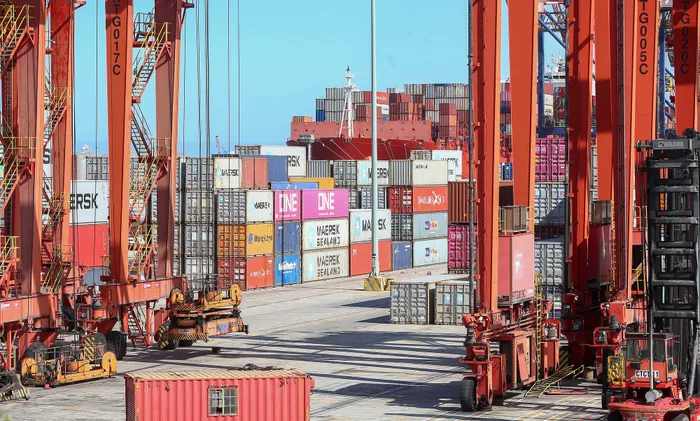
The bank said priority actions should include enhancing governance and operational efficiency of State-Owned Enterprises, particularly of Eskom and rail, ports and pipelines operator Transnet, to restore service reliability and unlock growth.
Image: Leon Lestrade/ Independent Newspapers
The African Development Bank (AfDB) has drastically cut South Africa’s gross domestic product (GDP) forecast for 2025 below 1%, saying that the economy continued to be weighed down by a range of structural constraints and could take a hit from Trump's trade war.
In its Country Focus Report for South Africa published on Wednesday, the AfDB lowered its forecast for Africa’s most-industrialised economy to a meager 0.8% this year from a previous estimate of 1.6%.
This forecast by the AfDB is more pessimistic than the National Treasury’s growth forecast of 1.4% for the year, which was revised down from a prior 1.9% on the back of geopolitical tensions including Trump’s trade levies.
It is also less than the South African Reserve Bank’s latest projection of 1.2% this year amid declining mining and manufacturing output and rising unemployment, though it is expected to rise to 1.8% by 2027.
S&P Global also recently lowered its 2025 GDP growth projection for South Africa to 1.1% from 1.3% previously due to weaker-than-expected GDP print for the first quarter.
AfDB country economist Akhona Peter said South Africa’s economy was vulnerable to external shocks particularly from the United States, its second largest export destination after China.
The Trump administration is expected to implement its hefty 31 import tariffs on a number of exporting countries next week, including South Africa, which exports a variety of minerals and commodities to the US.
US President Donald Trump said on Wednesday that he was not considering delaying implementing the tariffs again after he temporarily suspended them for 90 days in April.
“This is mainly on the fact that we expect trade tensions to pretty much affect net exports negatively,” Peter said.
“Industries such as agriculture, which rely heavily on US market access, will be particularly vulnerable. In the short-term, this could slow economic activity, decrease firm profitability, and constrain job creation in export-linked industries.”
The South African government is keen to ensure that the new requirements by the US do not unduly disadvantage local enterprises, hence the appeal for strategic patience from the South African industry.
South Africa’s proposed Framework Deal, which was submitted to the US Trade Representative in May, aims to tackle a range of US concerns including non-tariff barriers and longstanding market access issues.
It seeks specific exemptions from Sections 232 duties for key export products such as automobiles, auto parts, steel, and aluminium, ensuring these critical sectors can remain competitive in the US market.
Meanwhile, the AfDB recommended that the South African government should accelerate structural reforms to offset global challenges.
The bank said priority actions should include enhancing governance and operational efficiency of State-Owned Enterprises, particularly of Eskom and rail, ports and pipelines operator Transnet, to restore service reliability and unlock growth.
It also called for strengthening local government capacity, addressing spatial inequality, advancing digital government, promoting public-private partnerships (PPPs), and reducing wasteful expenditure through fiscal consolidation are also essential to improve service delivery and public trust.
“To accelerate domestic capital mobilization, reforms must focus on improving governance, enhancing institutional effectiveness, and fostering transparency and accountability. At the same time, promoting industrialization, deepening trade and investment, and building a competitive export base can drive higher growth and employment,” recommended the report.
“Tackling youth unemployment requires focused skills development and capacity building initiatives, aligned with labor market demands, to take full advantage of the country’s human capital.
“Trade needs to be diversified under AfCFTA and into new Asian markets. Lastly, improving the business environment by cutting red tape, ensuring fair market access for Small and Medium Enterprises (SMEs), and increasing labor market flexibility will support entrepreneurship, firm growth, and job creation — essential ingredients for sustainable economic transformation.”
BUSINESS REPORT